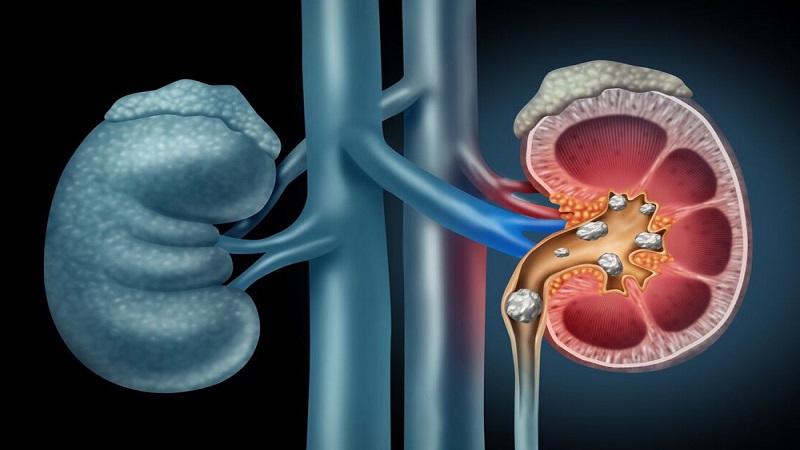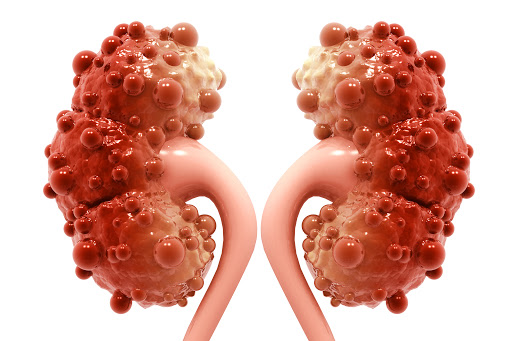
1403/05/07 11:05:29
Chronic kidney failure
refers to a condition in which the kidneys can't function properly, resulting in a significant decrease in their performance. The kidneys play a crucial role in removing waste products and maintaining the balance of water and electrolytes in the body. Kidney failure can be divided into two types: chronic and acute. Each of these types can stem from a variety of other bodily issues. In the advanced stages, maintenance treatment includes peritoneal or vascular dialysis and kidney transplantation.
Ways to diagnose it:
Chronic kidney disease leads to the deterioration of the kidneys, which is progressive and irreversible. The kidneys help maintain the balance of minerals and electrolytes like calcium, sodium, and potassium, play an important role in producing red blood cells, and regulate the acidity and alkalinity of the blood. So, if the kidneys are damaged, they can't perform their duties effectively.

Signs of chronic kidney failure:
- Cardiovascular system: shortness of breath, high blood pressure, and early heart disease.
- Musculoskeletal system: muscle weakness, bone pain, and gout
- Nervous system: tingling and numbness in the hands and feet, insomnia, fatigue, seizures, and altered consciousness.
- Gastrointestinal system: anorexia, nausea, vomiting, bad breath and gastrointestinal bleeding
- Blood-forming device: anemia, bleeding, and weak immune system
- Endocrine system: overactive parathyroid gland, menopause, impotence, infertility and increased blood lipids.
- Breathing device: shortness of breath and lung congestion
- Skin: Itchy and pale
The symptoms of kidney disease are:
-
Fluid retention, which can lead to swelling in the arms and legs, high blood pressure, or water retention in the lungs.
-
A sudden increase in potassium levels in the blood, which can cause heart function issues.
-
Anemia.
-
Reduced sex drive or sexual dysfunction.
-
Damage to the central nervous system, which can result in trouble concentrating, personality changes, or seizures.
-
Weakened immune response that leaves a person more susceptible to infections.
-
Pericarditis (inflammation of the membrane surrounding the heart).
-
Pregnancy complications that pose risks to both the mother and the developing fetus.
-
Irreversible kidney damage, which may eventually require dialysis or a kidney transplant for survival.
Kidney Failure Treatment :
When the kidneys fail, blood can no longer be filtered. Waste products and excess fluids build up in the body but aren't expelled, leading to an imbalance of chemicals. This can result in illness and even death. Although kidney failure has no cure, certain treatments can help keep the body functioning at acceptable levels.
Dialysis
Dialysis is a treatment for filtering blood. There are two types of dialysis:
Hemodialysis: This involves using a machine to filter blood. In this method, the patient is connected to a machine, and their blood circulates through it, getting cleaned before returning to their body.
Peritoneal Dialysis: This uses the natural membranes around the patient's abdominal organs. A fluid is injected into the abdomen, and along with the peritoneal membranes, it takes on the task of cleaning the patient's blood.
Special Tips for the Diet of Chronic Kidney Disease Patients:
- Due to the decreased appetite in patients, it's better to increase the number of meals they have daily and reduce the portion size of each meal.
- Because of dietary restrictions, the intake of vitamins and minerals should be done under the supervision of a doctor.
- Limit salt intake and avoid high-salt foods like pickles, tomato paste, salty yogurt, various sauces, and so on.
- Given the high potassium content in potatoes, peel them and soak them in water for two hours before consuming.
- Limit the consumption of legumes due to their high potassium levels.
- Meat should be completely lean and fat-free. Fish and chicken should also be consumed skinless.
- If cheese is consumed, it should be soaked in water for a few hours to reduce its salt content.
- Milk and yogurt should be low-fat.
- The oil used should definitely be of the liquid vegetable type. Special oil should be used for frying.
- Control the consumption of vegetables and fruits due to their high potassium content.
